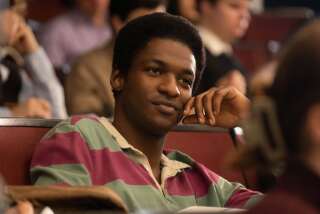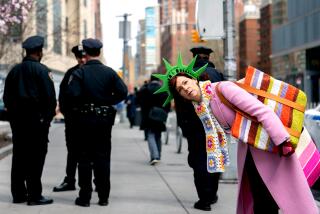Where ‘Ellen’ Blazed Trails, ‘Will & Grace’ Follows
- Share via
It’s been more than 16 months since Ellen DeGeneres and her alter ego, Ellen Morgan, came out of the closet and into our living rooms. As Ellen became the first TV show to feature an openly gay leading character, gay Americans were hopeful at the prospect of a newfound visibility for the next millennium. But the show was decreed by many viewers and critics to be “too gay,” the ratings declined and it was canceled.
In the aftermath, conventional wisdom suggested that network TV wouldn’t soon touch such a red-hot topic again. But lo and behold, one of NBC’s most promising new sitcoms this fall features a lead character who is (shhh!) gay.
In “Will & Grace,” Will (Eric McCormack) is gay, Grace (Debra Messing) is straight and they are best friends. TV has discovered the crackerjack combo that proved so successful in such recent films as “The Object of My Affection” and “My Best Friend’s Wedding.”
But NBC seems to be downplaying the gay factor, hoping that such restraint will allow “Will & Grace” to tiptoe past the land mines that tripped up “Ellen” and be rewarded with a large and diverse viewing audience.
Executive producers Max Mutchnick and David Kohan, who created “Will & Grace,” beg to differ, however, with the notion that “Ellen’s” fatal flaw was that it was “too gay.”
“Was ‘Birdcage’ too gay?” Mutchnick asks. “That’s a $100-million movie, and that movie was pretty gay.”
He opines instead that “Ellen’s” problem was not its gay quotient but its political agenda. And Kohan and Mutchnick plan to steer clear of an agenda, saying the show’s primary raison d’etre is to entertain.
“My only agenda,” says Mutchnick, who is gay, is that “I would want to introduce the world to a strong, dignified gay person . . . “
” . . . whose identity was not achieved solely through his sexual proclivities,” says Kohan, finishing the sentence.
“It’s beside the point, a little bit,” completes Mutchnick.
In fact, NBC is fond of saying (when it mentions it at all) that this is a show about a man “who happens to be gay.”
Such a modifier, suggests author Armistead Maupin, may be NBC’s assurance to viewers that the subject matter won’t get out of control.
“This is the network’s way of saying, ‘We know this sounds a little funny to you but trust us, we won’t make you uncomfortable with it,’ ” says Maupin, who created one of the first pairs of gay male/straight female friends in his 1976 novel “Tales of the City,” later adapted for television.
A wary posse of newspaper critics smelled fear during a news conference about the show in July; they barraged “Will & Grace’s” producers and director, James Burrows, with questions about whether Will will actually get to have a sex life. Some critics found it a little too convenient that the show’s back story has Will not dating because he’s recovering from the breakup of a long-term relationship. The first installment also features Grace splitting with her fiance.
When asked about displays of gay affection, Kohan responded, “Well, most of the affection that you will see will be between Will and Grace, initially. The two of them are really very much in sort of a healing mode.”
Will does have a flamboyant gay friend (played by Sean Hayes), but that relationship is platonic. What Kohan and Mutchnick really want to focus on is the friendship between Will and Grace. Extraneous lovers, they feel, will get in the way. The dating hiatus, Kohan maintains, is not about creating a convenient way to acclimate the audience to Will’s orientation--”it’s just good storytelling.”
The relatively uncharted dynamic between a straight woman and a gay guy is “the next evolutionary step” in the media’s depiction of gays, says Chastity Bono, former media director of the Gay and Lesbian Alliance Against Defamation. “Essentially, the gay neighbor down the hall has been promoted to best-friend status.
“We’re now seeing gay men in all different lights, but by having the main relationship be with a straight woman, you don’t have to show them having any sexuality,” Bono says. “Gay people are still not portrayed the same way straight people are, but we’re getting closer, and this is a nice step.”
Maupin agrees, but can’t help adding, “My cynical side says television is embracing this kind of relationship because it’s one more way to mine homosexuality for humor and deny the gay characters their sexuality.”
The producers are frustrated at being put on the defensive. “Everyone’s looking for us to be hiding from something, because they think that because ‘Ellen’ fell apart that we are going to have to cheat or something like that,” Mutchnick says. “So every choice we’re making is being interpreted as some sort of . . . “
” . . . evasive action,” offers Kohan.
They promise that when the time is right, Will will “get some,” as Mutchnick phrased it. In fact, Mutchnick proclaims, one of the first few episodes finds Will in a gay bar, where the bartender comes on to him. While nothing comes of it, they say this is because the dashing Will, a lawyer, is way out of the bartender’s league.
Another difference between Will and Ellen Morgan is that he is a character who came out years ago. “After you come out of the closet and become comfortable with your sexual orientation, it doesn’t dictate your entire life,” says Bono, who felt that much of mainstream America had been excluded when so many of the “Ellen” episodes dealt with gay issues.
Tracy Newman, a producer who helped write the “Ellen” coming-out episode, feels that after that acclaimed installment, the series “lost its lightness” and became “heavy-handed.” While Newman agrees with those who felt “Ellen” was proselytizing, she is also sympathetic to DeGeneres’ plight.
“You have a person who has been holding something back for so many years and had probably developed a certain amount of anger in relation to aspects of hiding,” Newman explains. “When she was finally allowed to just be open about who she was, she wanted to tell about all of her feelings.”
The show, Newman says, became about how gays were treated, as DeGeneres was intent on showing the audience what it feels like to be an outsider. This crystallized in an episode last season in which Ellen’s cousin Spencer dreamed he was in a world where heterosexuals were the minority.
Conversely, Mutchnick says that Will’s homosexuality will play like Paul Reiser’s Jewishness does in “Mad About You.”
“I’m gay but it doesn’t pervade my entire personality either,” Mutchnick says. “It comes up as much as it comes up, and I think that’s how much it comes up for Will.”
* “Will & Grace” premieres Monday at 9:30 p.m. on NBC (Channel 4).
More to Read
The complete guide to home viewing
Get Screen Gab for everything about the TV shows and streaming movies everyone’s talking about.
You may occasionally receive promotional content from the Los Angeles Times.






